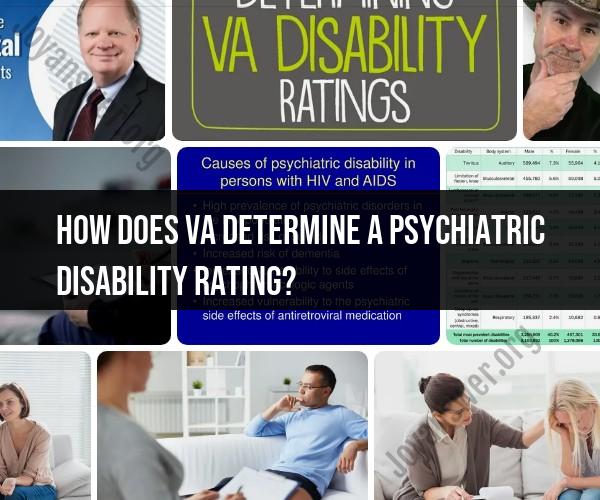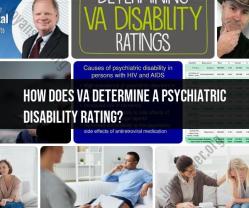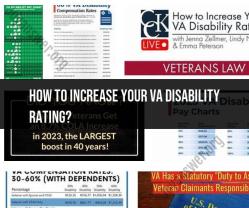How does VA determine a psychiatric disability rating?
The Department of Veterans Affairs (VA) uses a specific process to determine the disability rating for psychiatric conditions, just as it does for physical disabilities. Here is an overview of the process:
Diagnosis and Documentation:
- The process typically begins with a diagnosis of the psychiatric condition by a qualified healthcare professional. This diagnosis is based on medical evidence, such as clinical assessments, psychiatric evaluations, and medical records.
- It's essential to provide detailed and thorough documentation of the psychiatric condition, including its symptoms, history, and the impact it has on your daily life.
Claim Submission:
- To initiate a VA disability claim for a psychiatric condition, you will need to submit a formal claim to the VA. This can be done online through the VA's eBenefits portal, by mail, or with the assistance of a Veterans Service Officer (VSO).
Compensation and Pension (C&P) Examination:
- In most cases, the VA will schedule a Compensation and Pension (C&P) examination for you. During this examination, a VA healthcare provider or contracted examiner will assess your psychiatric condition.
- Be prepared to discuss your symptoms, experiences, and how the condition affects your daily functioning during the C&P examination. It's important to provide honest and accurate information.
Rating Criteria:
- The VA uses the "VA Schedule for Rating Disabilities" to evaluate psychiatric conditions. Each condition has a specific diagnostic code and rating criteria that determine the severity and corresponding disability rating.
- Ratings for psychiatric conditions can range from 0% to 100%, in 10% increments. A 0% rating means the condition is present but not severe enough to warrant compensation, while a 100% rating indicates total occupational and social impairment.
Evidence Review:
- The VA will consider all available evidence, including medical records, C&P examination results, and any statements or reports from mental healthcare providers, to determine the appropriate rating.
Rating Decision:
- The VA will issue a rating decision that outlines the disability rating assigned to the psychiatric condition. This decision will also specify the effective date of the rating and any benefits awarded.
Appeals Process:
- If you disagree with the assigned rating, you have the right to appeal the decision. You can request a higher rating or provide additional evidence to support your claim. The appeals process can involve multiple levels of review, including the VA's Board of Veterans' Appeals (BVA) if necessary.
It's important to note that psychiatric disability ratings are based on the impact of the condition on your ability to work and perform daily activities. The severity and duration of symptoms, as well as functional impairment, play a significant role in determining the rating. Seeking treatment and maintaining regular medical appointments for your psychiatric condition can also be important in the claims process. Consulting with a Veterans Service Officer or legal representative experienced in VA disability claims can provide valuable assistance in navigating the process effectively.
Psychiatric Disability Rating by the VA: How the Process Works
The VA uses a psychiatric disability rating system to assess the severity of a veteran's mental health condition and determine their eligibility for benefits. The rating system is based on the Diagnostic and Statistical Manual of Mental Disorders (DSM-5) and the VA's Schedule for Rating Disabilities.
To receive a psychiatric disability rating, a veteran must first file a claim with the VA. The claim must include evidence of the veteran's mental health condition, such as a diagnosis from a doctor or therapist, and a description of how the condition affects their daily life.
Once the VA receives the claim, it will be reviewed by a medical examiner. The examiner will assess the severity of the veteran's mental health condition and assign them a rating. The rating can range from 0% to 100%, with 0% representing no disability and 100% representing total disability.
The VA uses a number of factors to determine a veteran's psychiatric disability rating, including:
- The type of mental health condition
- The severity of the condition
- The duration of the condition
- The impact of the condition on the veteran's daily life
VA Disability Claims for Mental Health: Understanding Psychiatric Ratings
The VA's psychiatric disability rating system is complex, but it is important to understand how it works if you are a veteran with a mental health condition. Your psychiatric rating will determine how much money you receive in disability benefits and what other benefits you are eligible for.
Here are some of the key things to understand about the VA's psychiatric disability rating system:
- The VA uses a number of factors to determine your rating, including the type and severity of your mental health condition, the duration of your condition, and the impact of your condition on your daily life.
- The VA uses a rating scale of 0% to 100%, with 0% representing no disability and 100% representing total disability.
- A rating of 20% or higher means that you are eligible for monthly disability benefits.
- A rating of 30% or higher means that you are eligible for priority healthcare at VA facilities.
- A rating of 50% or higher means that you are eligible for additional benefits, such as vocational rehabilitation and housing assistance.
Mental Health and the VA: What Determines Your Psychiatric Disability Rating
The VA uses a number of factors to determine a veteran's psychiatric disability rating, including:
- The type of mental health condition: Some mental health conditions, such as post-traumatic stress disorder (PTSD) and major depressive disorder, are more likely to result in a higher rating than others.
- The severity of the condition: The more severe the mental health condition, the higher the rating is likely to be.
- The duration of the condition: The longer the veteran has had the mental health condition, the higher the rating is likely to be.
- The impact of the condition on the veteran's daily life: If the mental health condition has a significant impact on the veteran's ability to work, socialize, or perform other activities of daily living, the higher the rating is likely to be.
It is important to note that the VA's psychiatric disability rating system is not always straightforward. There is no one-size-fits-all approach to rating mental health conditions. The VA will consider all of the factors listed above, as well as the individual veteran's unique circumstances, when determining a rating.
If you are a veteran with a mental health condition, it is important to file a claim with the VA to determine if you are eligible for benefits. The VA has a number of resources available to help veterans with the claims process, including Veterans Service Organizations (VSOs).







